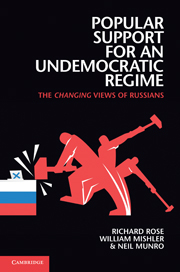Book contents
- Frontmatter
- Contents
- List of figures
- List of tables
- Introduction: The need for popular support
- 1 Democratic and undemocratic models of support
- 2 Changing the supply of regimes
- 3 Putin consolidates a new regime
- 4 Increasing support for an undemocratic regime
- 5 Individual influences on regime support
- 6 Time tells: there is no alternative
- 7 Finessing the challenge of succession
- 8 The challenge of economic reversal
- 9 Maintaining a regime – democratic or otherwise
- Appendix A New Russia Barometer samples
- Appendix B Coding of variables
- References
- Index
Introduction: The need for popular support
Published online by Cambridge University Press: 05 June 2012
- Frontmatter
- Contents
- List of figures
- List of tables
- Introduction: The need for popular support
- 1 Democratic and undemocratic models of support
- 2 Changing the supply of regimes
- 3 Putin consolidates a new regime
- 4 Increasing support for an undemocratic regime
- 5 Individual influences on regime support
- 6 Time tells: there is no alternative
- 7 Finessing the challenge of succession
- 8 The challenge of economic reversal
- 9 Maintaining a regime – democratic or otherwise
- Appendix A New Russia Barometer samples
- Appendix B Coding of variables
- References
- Index
Summary
The history of government is first of all a story of the state's capacity to mobilize support. Notwithstanding big differences between democratic and undemocratic political systems, they have one thing in common: All forms of government require political support to maintain their authority (Finer, 1997; Vu, 2010). Max Weber characterized authority as Herrschaft, a term connoting domination not democratization (1947: 152n). The pyramids of Egypt are a monument to the power of pharaohs to mobilize enough support to build a political system that lasted many centuries. North Korea is a striking contemporary example of a regime that has lasted more than half a century by using totalitarian methods to coerce citizens to be resigned to give it a show of support. However, the evolution of Anglo-American democracies shows that popular support can be achieved without coercion.
In the short term a regime may survive by coercion, for example, a puppet regime established by an occupation army; however, the long-term survival of a regime requires voluntary support or at least the resigned acceptance of the mass of its population. The history of the past century shows that many regimes have been assigned to the ash can of history because of a lack of support. For decades the Soviet Union appeared to be secure with the support of its citizens, and elsewhere in the Communist bloc regimes appeared to demonstrate that governments could rest on bayonets.
- Type
- Chapter
- Information
- Popular Support for an Undemocratic RegimeThe Changing Views of Russians, pp. 1 - 10Publisher: Cambridge University PressPrint publication year: 2011

